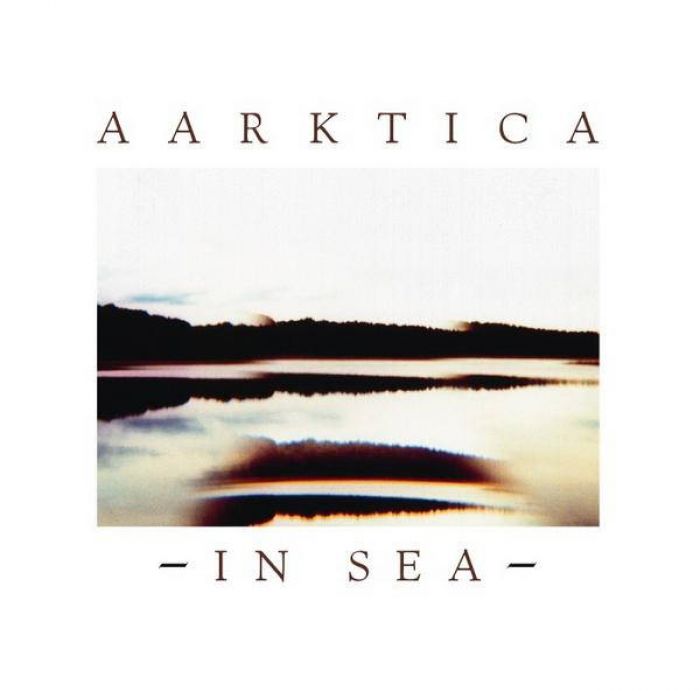In Sea by Aarktica (Review)

For nearly ten years, Jon DeRosa has been producing music with the goal of capturing the sounds that exist inside his head. That may be the goal for all musicians, but in DeRosa’s case, there’s a bit more to it than that. You see, DeRosa is deaf in one ear and as a result, has had to live with aural distortions and hallucinations (not to mention the effects of painkillers) — all of which have served as inspiration for his music.
Originally, his attempts consisted of drone-oriented ambient recordings such as 2000’s No Solace In Sleep. Subsequent albums — e.g., 2003’s Pure Tone Audiometry, 2005’s Bleeding Light — saw DeRosa eschewing his earlier, pure ambient approach for a more structured, song-oriented sound.
Those later recordings contained memorable moments, but I’ve always found Aarktica’s music most affecting and involving when DeRosa is truly immersed in his dronework, however ominous and unsettling it might be. So it shouldn’t come as any surprise that I like In Sea so much, as Aarktica’s latest finds DeRosa returning to the noisier drones and atmospherics that first typified Aarktica.
Well… almost.
Don’t get me wrong: In Sea ranks up there with No Solace In Sleep when it comes to atmospherics, but they’re cleaner and more polished this time. The result, I’m sure, of both recording in a real, honest-to-God studio (by contrast, No Solace In Sleep was recorded in a dorm room on a dying 4-track) and DeRosa’s decade of experience coaxing all manner of sounds from his gear.
This is best seen in the album’s opening track, “I Am (The Ice),” where DeRosa sets off slowly revolving tundra drones while a band of sparkling, crystalline guitar notes arcs high overhead. It’s a gorgeous and rather affecting piece that evokes an Arctic sunrise as much as the most glorious moments of Flying Saucer Attack’s career. Later, on the title track, DeRosa picks out a gentle guitar melody then sets it adrift amidst a sea of guitar effects and noise swells — meanwhile, the reverbed sounds of his hands sliding along the guitar strings adds a human feel to the otherwise otherworldly music. And finally, on “When We’re Ghosts,” DeRosa wraps the listener in tight guitar loops before lashing out with violent, ragged bursts of noise, which results in the album’s most gripping moments.
But even though In Sea is a return to Aarktica’s roots, there are some surprises, most notably in the vocals. DeRosa’s voice has always been Aarktica’s weakest element for me: his music is strongest when he steps back and lets his atmospherics do the singing. But DeRosa’s voice appears on two of In Sea’s tracks, and they turn out to be two of the album’s finest moments.
The first is “Hollow Earth Theory,” which gets my vote for DeRosa’s best vocal performance to date: here he sings “We will wait and we will see/If it’s right to put our faith all/In this hollow earth theory” over building layers of guitar. It’s a simple enough approach, and yet the song’s longing-filled lyrics and surging melodies combine to have quite an emotional effect.
The second is a cover of Danzig’s “Am I Demon.” At first, it seems like a joke — I think I did a double take when I read the press release — but as DeRosa distantly sings “Am I beast or am I human/Am I just like you?/Power seething, really reeling, reaching out for you/Am I demon? Need to know” while surrounded by murky, ominous tones and somber guitar lines, he achieves a sense of foreboding that far outshines Danzig’s original version.
T.S. Eliot’s famous quote — “We shall not cease from exploration, and the end of all our exploring will be to arrive where we started and know the place for the first time” — strikes me as an appropriate description of In Sea. After ten year of sonic exploration, In Sea is a return to where DeRosa began, the result being an album that represents a deeper exploration and knowledge of his familiar sounds. As such, it’s probably replaced No Solace In Sleep as my favorite Aarktica recording — no longer can I say “I liked their earlier stuff better” in good conscience — and I hope it sets the stage for Aarktica’s next ten years.